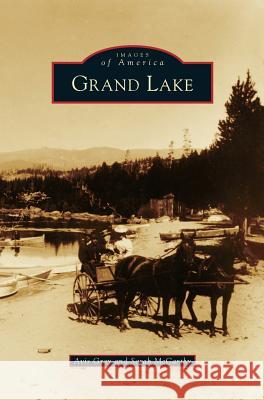Grand Lake » książka
Grand Lake
ISBN-13: 9781531677770 / Angielski / Twarda / 2015 / 130 str.
The village of Grand Lake, Colorado, located at 8,367 feet above sea level, is the western gateway to Rocky Mountain National Park amid the Never Summer Wilderness Area. Nestled along the shores of the largest, deepest, and--many suspect--coldest natural lake in Colorado, the village presents a charming portrait of snow-capped peaks, moose hollows, and glacier-fed waters that surround a town with wooded boardwalks and historic hewn-log hotels. Only a few generations ago, the area was the hunting and fishing grounds of both the Ute and the Arapaho Indian tribes, who each called the clear body of water "Spirit Lake" based on their own legends about this mystical place. The village's hardy mountain residents, many of whom are descendants of the area's original permanent settlers, help to shape, but never conquer, the subalpine terrain, with its annual unforgiving winter environments and perfect summer evenings. Times are still simpler in this mountain village but also accurately reflect an octogenarian resident's words: "life might be easier now, but it was simpler in the days of kerosene lamps and wood burning stove, when each man's sleigh bells had their distinctive ring." We present mostly the "then" and some of the "now" of Grand Lake, which are both unusually similar and equally admired by residents and visitors alike.
The village of Grand Lake, Colorado, located at 8,367 feet above sea level, is the western gateway to Rocky Mountain National Park amid the Never Summer Wilderness Area. Nestled along the shores of the largest, deepest, and--many suspect--coldest natural lake in Colorado, the village presents a charming portrait of snow-capped peaks, moose hollows, and glacier-fed waters that surround a town with wooded boardwalks and historic hewn-log hotels. Only a few generations ago, the area was the hunting and fishing grounds of both the Ute and the Arapaho Indian tribes, who each called the clear body of water "Spirit Lake" based on their own legends about this mystical place. The villages hardy mountain residents, many of whom are descendants of the areas original permanent settlers, help to shape, but never conquer, the subalpine terrain, with its annual unforgiving winter environments and perfect summer evenings. Times are still simpler in this mountain village but also accurately reflect an octogenarian residents words: "life might be easier now, but it was simpler in the days of kerosene lamps and wood burning stove, when each mans sleigh bells had their distinctive ring." We present mostly the "then" and some of the "now" of Grand Lake, which are both unusually similar and equally admired by residents and visitors alike.











